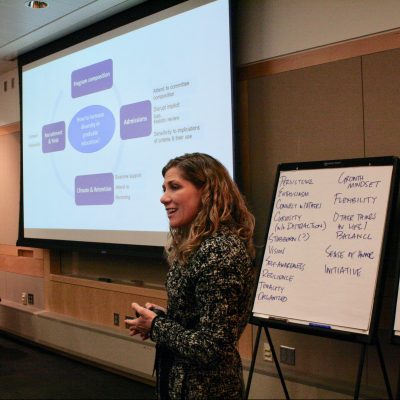Posselt Advocates for Holistic Review Practices

By Katya Hrichak
Graduate schools spend considerable time and effort recruiting talented students who are a good fit for their programs. Recent research has questioned how admissions committee practices could be improved to more effectively identify high potential students using holistic methods. Several institutions, and some graduate fields at Cornell, are beginning to rethink their approach to admissions.
Speaking to a capacity crowd, Julie Posselt, author of Inside Graduate Admissions: Merit, Admissions, and Faculty Gatekeeping (Harvard University Press, 2016) and associate professor of higher education at the University of Southern California, presented her research on the graduate admissions system and explored several proposals on how to improve it.
In her talk, “Holistic Review and Advancing Diversity in Graduate Education,” Posselt discussed how she “knew something strange was going on at the admissions table” after repeatedly witnessing students with red-flagged records gain admission to highly-regarded institutions while promising students received rejections from less competitive Ph.D. programs. Her curiosity led to a study of 10 doctoral programs at six institutions that examined admissions practices, including admissions committee composition, language used by faculty in discussion about applicants, and application review processes.
“The goal was to understand how it is that faculty and institutions espouse this commitment to diversity and nevertheless conduct admissions in ways that tend to undermine it,” Posselt said. “I wanted to get inside of that apparent paradox, assuming that faculty for the most part are pretty well-intentioned people who would prefer not to reproduce inequalities.”
She identified five admissions practices she sees as requiring improvement: how the initial cut is made; lack of structure and implicit bias in review; how committees are constructed, trained, and maintained over time; a need for making equity checks along the way; and seeing admissions, recruitment, and retention as a system of institutional practices.
Posselt also emphasized the need for programs to conduct critical reviews of their admissions requirements and review practices, including controlling implicit bias in the way reviewers perceive and speak about candidates.
“We basically need to improve the ways that we’re discussing individual candidates when we get into the more holistic approach to doing that, and be a little bit more thoughtful in the ways that we do so,” she said.
Replacing the single personal statement with multiple short-answer questions generated to target positive attributes and developing rubrics to use while reviewing applications or interviewing candidates were two proposed solutions. Rubrics, she added, address common issues of efficiency, structure, specificity, transparency, reliability, and accountability.
At Cornell, each graduate field makes decisions on their application requirements and how to conduct their admissions processes. This includes determining factors such as whether to require interviews or GRE scores as part of the admissions process.
To refine their admissions practices and broaden their strategic diversity recruitment efforts, Cornell’s graduate field of biochemistry, molecular and cell biology engaged in a multi-year effort to pilot new admissions practices. One of the efforts included piloting the 2017-18 doctoral admissions cycle without referencing GRE scores. Other modifications to the field’s admissions practices included increasing engagement with prospective students, reviewing how applicant files are reviewed, and creating a process to identify and mitigate the potential for implicit bias. These combined changes led to a more diverse and academically stronger cohort of admitted and enrolled students, informing the field’s decision to subsequently drop their GRE requirement.
Also opting for a more holistic and proactive recruitment strategy, the field of computer science became GRE-optional in the last admissions cycle along with implementing other changes including modifying their applicant review practices and becoming more expansive in outreach to prospective applicants.
“The fact that our graduate fields are having conversations around how to refine their admissions requirements and practices to help ensure a fair and unbiased admissions process is a strong testament that graduate admissions committees across the university recognize the importance of a holistic approach to reviewing applicants,” said Senior Director of Recruitment at the Graduate School Anitra Douglas-McCarthy. “Just as importantly, it means they are also willing to take an introspective look and assess how admissions are being handled within their particular field, and this is encouraging.”
Following a positive response to her Fall 2018 talk, Posselt will be returning to campus August 19 with Casey Miller, associate dean for research and faculty affairs, and professor of materials science at the Rochester Institute of Technology, to lead a daylong faculty workshop on holistic admissions practices. While at Cornell, they will also lead a mini-workshop with graduate students and postdocs to support their training as future faculty.
These events are hosted by the Graduate School Office of Inclusion and Student Engagement (OISE) and the Center for the Integration of Research, Teaching, and Learning (CIRTL) at Cornell and are supported by the NSF AGEP Transformation Alliance: Improved Academic Climate for STEM Dissertators and Postdocs to Increase Interest in Faculty Careers (NSF Grant No. 1647094). Any opinions, findings, and conclusions or recommendations expressed during this event are those of the speakers and do not necessarily reflect the views of the National Science Foundation.
Register for the Faculty Holistic Review Workshop for Graduate Admissions.
Register for the Holistic Graduate Admissions Mini-Workshop for Future Faculty.
Katya Hrichak is a communications assistant in the Graduate School.
